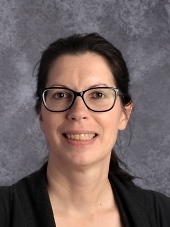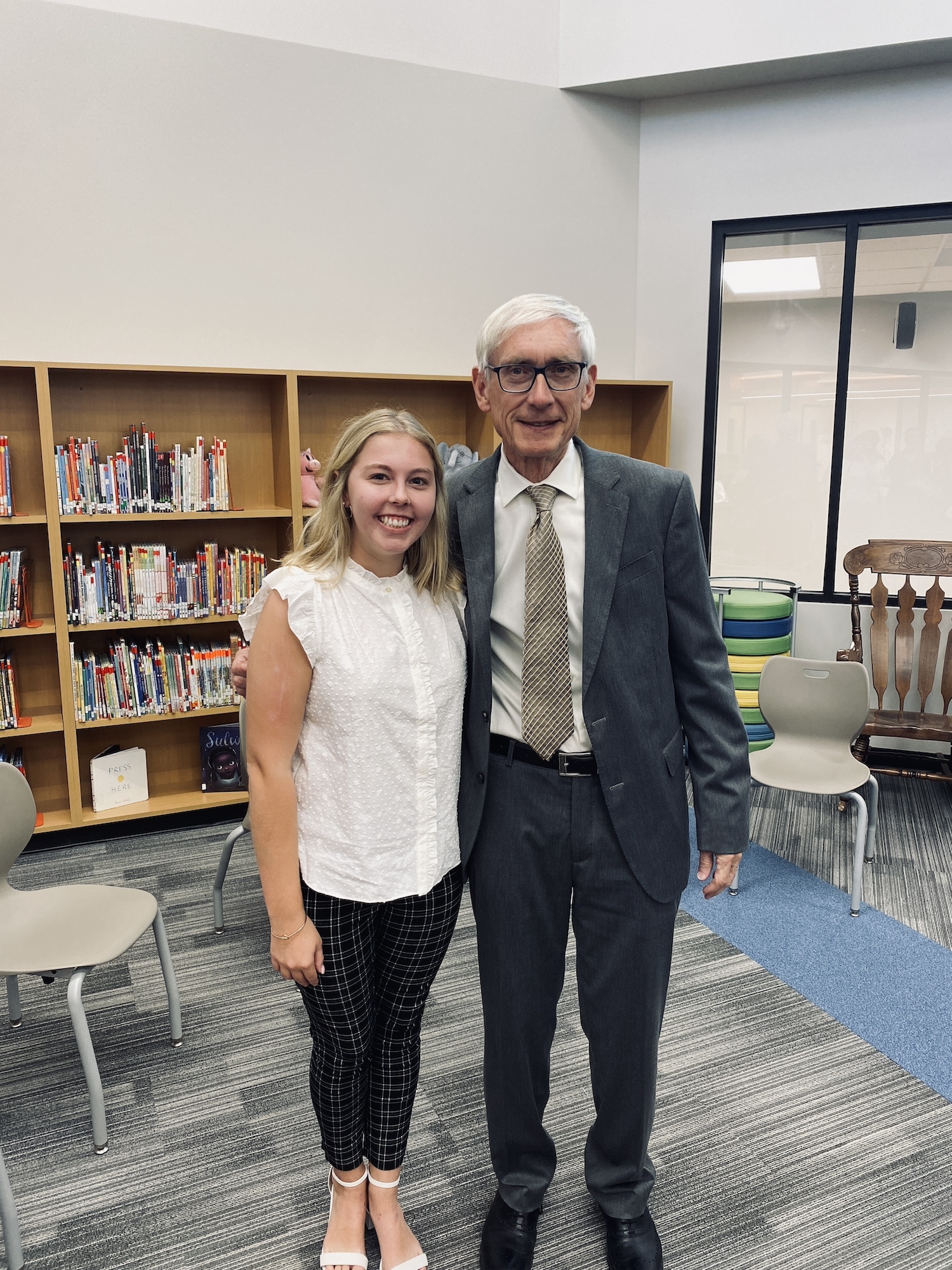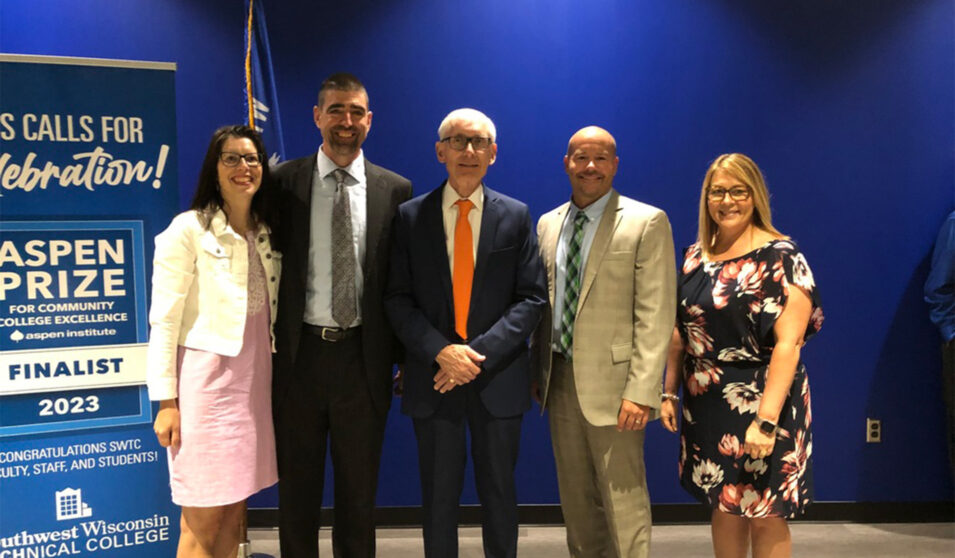
Liz Dostal, the Middle & High School Principal at Wisconsin Heights, faces a challenging hiring and retention landscape familiar to so many leaders of rural schools. It can feel like an avalanche of open positions: at her school outside of Mazomanie, WI, there are vacancies in subjects such as business and culinary, with more potentially looming in the future. A struggle to retain talented staff is ever-present, accelerated by competing with highly-resourced suburban school districts. Having enough time in the day and capital at hand to solve these issues remains limited.
Despite facing these challenges, however, Liz has spearheaded a consortium of Wisconsin Schools to invest in intentional recruitment through an innovative Grow Your Own program. The GROW Cooperative, composed of Wisconsin Heights, Lodi, Cambridge, and Sauk Prairie school districts, unites four rural southern Wisconsin school districts in the pursuit of talented, motivated teachers within their local communities. While a Grow Your Own program will not lead to immediate placements and magically fill vacancies, such programs are meaningful investments in the future health of rural school districts and communities.
The premise behind Grow Your Own programs is simple: while rural school districts may struggle to attract teacher candidates from elsewhere, living within their communities are talented, skilled people who are already invested in where they call home. Some may be currently in school, while others may be career changers. Others yet might be paraprofessionals, in schools but not classroom teachers. Therefore, a successful Grow Your Own program identifies, trains, and supports the education and return of potential local teacher candidates. The nuts-and-bolts of the program are straightforward, and aim to recruit and invest in potential teachers at multiple stages of their career preparation.
High school students can take a maximum of 12 college credits, online, via nearby University of Wisconsin-Whitewater. By offering credits for education classes, it gives Grow Your Own candidates a jumpstart on college, and engages them early with the theory and realities of teaching. Grow Your Own programs aiming to offer college credits can struggle to find and hire accredited teachers for these classes, so the partnership with UW-Whitewater is a valued resource in making these offerings possible. In the spirit of Grow Your Own programs maximizing local resources, students are also able to be mentored by in-house teachers in their prospective content areas, enriching their education and creating important early professional connections.
Financial incentives are also an important component to supporting and recruiting prospective educators. First, each district makes available one $1,000 scholarship to support a high school senior who intends to major in education. Once in school, ten $2,000 scholarships are available, on an annual basis, to college students who are intending or declared in education. During pre-service teachers’ senior year, they can apply for a $10,000 scholarship that supports their degree completion, contingent on them applying and interviewing for a position in a GROW consortium district. They must teach for three years in a consortium district, and if so receive that scholarship. The experience is as important as the relationship, as Liz explains: “It's another pipeline because I know getting student teachers into your building also helps build that relationship that you want with people who are graduating.”
While that may seem like a significant cost with no promise that a current 17 or 21-year old will end up being a long-standing teacher in your district, the lack of available candidates means developing your own teaching pool is becoming increasingly essential for rural districts. “What I've seen with in regard to teachers, like when I started my career, it wasn't uncommon, it was actually very common for many people to teach small rural districts and then they would get their experience and then be able to go to a larger district for more pay, better benefits, that kind of thing.” Rural schools can’t compete financially with wealthy suburbs, and administrators like Liz can’t blame them for pursuing higher pay, fewer hours, and more prep blocks.
The COVID-19 pandemic, and the strain it put on schools, added fuel to the fire in challenges around the recruitment and retention of rural teachers. An unlikely impetus, however, got Liz thinking about Grow Your Own at her school: “My former superintendent was working on his doctoral dissertation, the impact that Act 10 had on candidates going into the field [of teaching], and then what were rural schools seeing as an impact from Act 10. I was his editor on his dissertation. . . At the same time we were coming out of COVID and as funds were being released to the states, [Wisconsin] Governor [Tony] Evers put ESSER money into grants for economic development and employment, so I said ‘Why don’t we apply?’ and we can use the dissertation as evidence for why the program is needed.”
To jumpstart this program, Liz applied for and received a Wisconsin Innovation Grant through the Department of Workforce Development. While that money would provide the initial funds, to ensure longevity and sustainability of the program Liz and each of the other cooperating districts contribute annually to an account which guarantees the perpetual continuation of investment money needed for the GROW Cooperative. Early returns are promising: four out of five graduating teacher candidates applied for and received a position in their home district (the money was repaid from the fifth), and there are additional hopes that the investment in high school and current college students will lead to placements in the future.
Having knowledge of potential candidates' content areas ahead of time and being able to plan multiple years into the future unlocks pathways to sustainability that wouldn’t exist without a Grow Your Own program. This works all the better if strong relationships with those potential teachers have been forged already. Moreover, collaboration between the GROW Cooperative districts means that they can work together to find placement opportunities for upcoming graduates:
The GROW Cooperative is incredibly beneficial for schools, and also opens doors to teaching for individuals who may not have been able to financially commit or make a career transition. Two of the four current teachers who enrolled in the program were career switchers, and the scholarship gave them the financial flexibility to earn certification before becoming a full-time teacher. For others, it enabled them to return to their home districts, potentially even returning to the same school they attended as a child.
Eliza Gullickson came up through the Wisconsin Heights School District, and had an inside connection into the school that most other students, and prospective teachers, aren’t always afforded: “My mom is a third grade teacher here, so I grew up coming to school early: I got to know all the teachers and all the things that they do behind the scenes. I stayed late with my sister and I just got to know the real part of teaching, and I always loved it.” Despite that early connection to education, after leaving for college, Eliza wasn’t sure that teaching would lead her back to her hometown of Mazomanie. The GROW scholarship, however, opened a door to student teaching in her home community, gaining practical experience while receiving support from a familiar system.

The combination of financial support and an uplifting community brought her home, with the prospect of a full-time position serving as the icing on the cake. To Eliza, it was a perfect storm of possibility: “I was able to take over a classroom with observation for the first month and then the head teacher went on maternity leave. So I stepped in right away. I can't even imagine doing regular student teaching. I learned so much from that experience. I know families in the district from that experience. So it really opened a lot of opportunities. And I'm glad I did it this way.”
Eliza’s story highlights the strengths of a Grow Your Own model, which leverages the positive relationships within rural spaces to develop educators who actively want to stitch their own story into the fabric of rural communities. When the school and community show an investment in emergent educators, a reciprocal passion from the teacher is uplifted out of that relationship: “the community really backs you up. I've had many people say ‘it is so cool that you're coming back to [Wisconsin] Heights! We are very, very lucky. I'm here because I had an opportunity to grow up in such an amazing way.”
By elevating the Grow Your Own model to a collective of districts, cooperation increases, while competition for limited resources and staff decreases: as Liz Dostal puts it, “it has helped increase communication and lessen the competition between us.” When districts aren’t in competition, they can direct resources towards recruitment and retention efforts, crucial to building a sustainable staff. The positive relationships and potential pathways create more opportunities for educators to return home, like Eliza, and strengthen schools, one teacher at a time.




